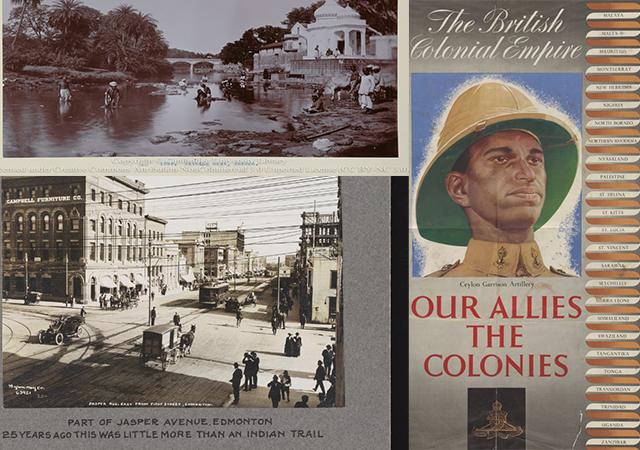 Clockwise: Bathing Ghat, Indore (1905), British propaganda poster from the Second World War (circa 1942), Edmonton, Alberta (1912-1919). [Courtesy: The RCS]
Clockwise: Bathing Ghat, Indore (1905), British propaganda poster from the Second World War (circa 1942), Edmonton, Alberta (1912-1919). [Courtesy: The RCS]
Cambridge University Library has made public a digital archive of the Royal Commonwealth Society (RCS)’s history as the Society marks its 150th anniversary and the 25th anniversary of its library and archives becoming part of Cambridge University Library.
The society was formed in 1868 as the Colonial Society to promote knowledge and appreciation of Britain’s overseas territories. As the RCS website stated ‘it was conceived of as an intellectual endeavour where papers would be presented at meetings and published in the society’s journals, and the creation of a research library was at the heart of the project’.
The library has developed into what the society describes ‘a library within a library’ providing ‘one of the world’s great resources for the study of the more than 50 nations which form the modern Commonwealth, containing more than 350,000 printed items, 900 archival collections, 150,000 photographs, and significant collections of artwork and artefacts’. It includes 300,000 printed items; over 800 archival collections – including manuscript diaries, correspondence, pictures, artefacts, cine films, scrapbooks and newspaper cuttings – and over 120,000 photographs.
The exhibition of 100 newly-digitised images, not previously available in digital form, showcases the international breadth and visual richness of the RCS archives. The RCS said of its digital exhibition that it provides a ‘stunning visual records – art-work, photographs, maps and artefacts, as well as illustrated manuscripts and printed sources relating to the Commonwealth and Britain’s former colonial territories. We have selected items which showcase the international breadth and visual richness of the archives. Some document important events in the history of the Society, others significant architectural or engineering achievements. Many record incredible changes to natural environments or urban landscapes. Others tell very personal stories, record every-day life, document journeys across continents or capture the horrors of war. Together and individually the records form an invaluable heritage resource which we are delighted to be able to share in this way’.
Related links:



